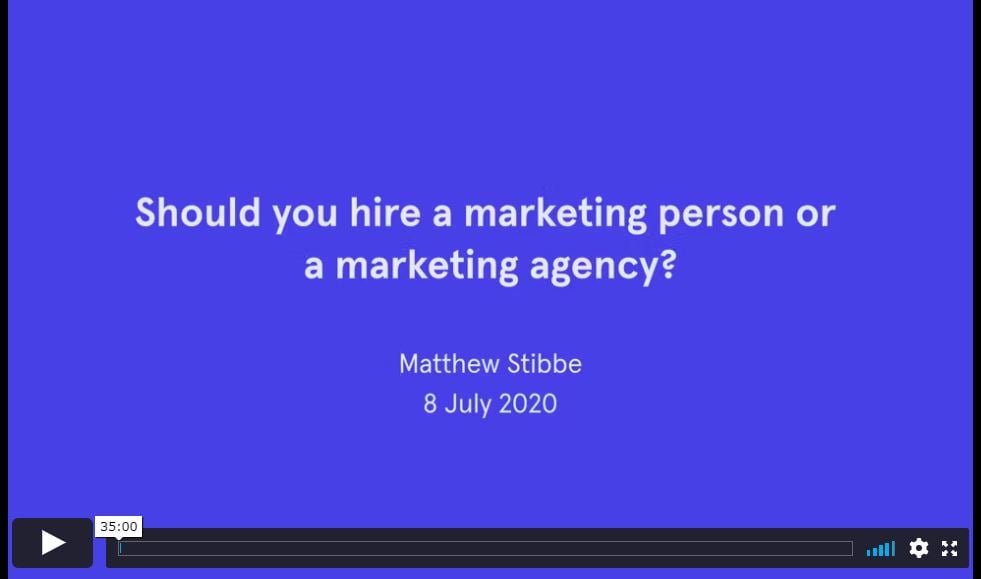'No bucks, no Buck Rogers' as the astronauts say in Tom Wolfe's The Right Stuff.
In other words, if you want your sales to take off, you need to invest in marketing to:
- Attract new customers
- Nurture existing ones
- Raise your profile
- Differentiate your business
So far, so obvious. But should you hire your own marketing staff or work with a marketing agency?
Watch the webinar
We recently did a webinar on this very subject! Watch the video:
Why you should hire a marketing agency
Full disclosure: I run a marketing agency. I'm generally in favour of people hiring marketing agencies. But there are also statistics that back up my bias. The Content Marketing Institute found that 57% of the most successful businesses it surveyed outsourced some of their marketing activity, compared to 36% of the least successful businesses.
At Articulate Marketing we typically work with B2B companies, often in the tech industry, such as managed services providers (MSPs) or software developers. These businesses ‘speak tech’ loud and clear because that’s their expertise. But they tend to need help translating their messages for potential clients.
Let me explain why I believe hiring a marketing agency is the right choice before I look at the reasons for hiring in-house marketing staff.
1. Owner/managers are not superheroes
The owners of small to medium-sized businesses are usually the founders. They’ve built their business from the ground up, and it’s not just a job, but also a labour of love.
For many owner/managers, taking on more responsibility seems like a logical, natural part of running a business. Many feel that the skills and experiences of others can’t compare to their own. Only they know what’s best for their company and their clients.
This is okay in the short term. But in the long term, it can start to affect both your mental and physical well-being. Studies have shown that people who work excessively long hours are 40 percent more likely to suffer from coronary heart disease than those working standard hours.
No one is a superhero. You don't do a part-time law degree to write your contracts - you ask a lawyer for help. You don't do your own tax returns - you ask an accountant for help. It makes sense to outsource roles that require specialist expertise. It's the same with marketing.
If you take all the burden of running a business on your shoulders alone, including marketing, it might eventually crush you. Don’t allow your business to be your kryptonite. Stay strong and let an agency contribute its expertise and resources.
2. Specialist knowledge
It is impossible to know everything. This is why hiring an agency makes good business sense; you’re explicitly purchasing the services of experts.
An agency will be an expert in its field (e.g. marketing, sales, PR). It will have more collective knowledge than any one owner/manager and access to in-house expertise on the finer details. A marketing agency like Articulate, for example, doesn’t just have ‘expert marketers.’ We have experts in the different disciplines of marketing:
- Brand and marketing strategy
- Website development
- HubSpot
- Copywriting, thought leadership and SEO
- Graphic design
Not only that, but marketing agencies like ours specialise. We have experience in marketing, but we also focus on a specific industry—B2B tech for good. It means we can meet your expertise halfway with existing knowledge of and experience with your markets and ICPs.
3. Savings on salaries, time and training
For a business, controlling expenditure can mean the difference between success and failure. Cost control and proper expense management are essential for ensuring liquidity, employee accountability, more accurate financial records, and better budgeting.
One of the most common expenses in business is recruitment. Most companies **underestimate the cost of recruitment by between 90 to 95 percent.** This is because of the tendency to think of the cost of employing someone simply in terms of their basic wage. But there’s also payroll tax, pensions, employee benefits, training and more to account for.
Once you've hired them, you have to pay them. An experienced marketing manager would cost you, on average, between £60,000 and £120,000 per year in salary. That’s excluding costs for:
- Learning and development
- Pensions
- Perks
- Other necessary expenses like IT equipment and martech
Of course, you can hire more junior staff, but will they have the experience and skills to guide your strategy and its effective execution? And who will mentor them? What happens when they leave? Or go on holiday?
And though the average retainer for an agency should **cost the same as the staff cost of an appropriately sized in-house team,** there’s a catch. Hiring an agency doesn’t incur ‘hidden costs’ and it means you spend less time and money on onboarding, training and developing employees.
This is a key difference between internal employees and an agency. Employees require training. An agency was born ready. From the second you hire them, they are ready to get started.
.png?width=2757&height=2095&name=EOS%20accountability%20chart%20(1).png)
What ‘born ready’ looks like at Articulate Marketing—The Difference Engine approach.
The reasons why you should hire an agency are clear. For less than the cost of an in-house team, you get access to expert knowledge and a team whose only remit is to focus on what they’re good at.
But, you shouldn’t hire an agency too early. Here are some indicators to help you decide when you should call an agency.
1. When nothing is getting done
The world of work is a busy place. More often than not, multiple things need to be done at the same time. It’s only natural that something might slip or, worse, remain incomplete. When the important jobs are not getting done, it’s time to get some help. Agencies have specialist teams that can hit the ground running with specific tasks, minus the day-to-day operations and distractions.
2. When sales and growth are stagnating
If a business is stalling, growth is slowing and you spend most of your time putting out fires rather than being productive, something’s got to change.
Many things can stall sales and growth. It can be ineffective marketing, poor customer service or mismanagement. No matter the symptom, you can find the cure with an agency. Outsourcing failing sections of a business can revitalise and kick-start growth. Sometimes all it takes is a little outside perspective.
3. When your ambitions exceed your capability
Businesses can have ambitions for the future that they cannot achieve with their current capabilities. It can be as simple as not having the requisite manpower or an inherent lack of knowledge on how to achieve these objectives. Regardless, if you don’t have what you need, an agency can either provide or find it for you.
The positives and pitfalls of in-house marketing
There are, of course, benefits to having an in-house marketing team:
- They have the access and focus to develop expansive, intuitive knowledge of your products and services (particularly helpful for government contracts and high-value, early-stage startups.) With that said, an agency worth its salt will also invest time to learn everything it needs to about your business, like a marketing chef de partie.
- They’re on hand for the ‘high-touch’ aspects of marketing, such as video production, technical product documentation, and in-person events, such as trade shows and live demos.
- They’re less expensive by the hour than agencies, which have to build a profit margin into their fees (because we’re businesses, too!) This can be more cost-effective for high-volume support tasks such as SEO link building, data entry, and content curation.
But there are also plenty of pitfalls that incur opportunity costs—in this case, the cost of choosing ‘cheap’ over ‘good value’ by only using in-house marketing:
Part-time marketing
It's tempting to give someone a marketing role as an add-on to another job. Perhaps it gets assigned to a salesperson or to an office manager.
That’s a start, but a part-time marketer can never do everything they need to do to attain strong business growth. Marketing is a full-time job.
Under-investment in marketing
The next step for many companies is to hire just one marketing person. This is an improvement on a part-time assignment but it can be a lonely role, often with relatively low status.
We did 18 digital marketing reviews for Microsoft on some of their partners. In many cases, we found that companies might have 10-20 salespeople but only one or two people in a marketing role.
Intuitively, it makes sense to invest in a sales team: more salespeople = more sales (perhaps). If you apply a shop metaphor, that’s like saying you need more checkout till operators. But you also need to get people into the shop in the first place and that’s a job for marketing. Here’s the exam question: if you had twice as many warm inbound leads, would you still need so many salespeople doing cold outreach?
We also see many smaller clients assigning responsibility for marketing to the head of sales. Titles like “Director of sales and marketing” are common. In our experience, everyone with a title like this has come from the sales side of the equation and often has limited experience of marketing but a lot of sales experience. Again, it is understandable, but tends to lead to a great emphasis on familiar sales strategy rather than unfamiliar marketing growth.
Both tendencies mean that when companies decide to expand their marketing they tend to hire relatively junior marketers, even interns with no experience at all, and assign them low-impact work that supports the sales process rather than driving differentiation and accelerating lead generation. Working alone, these solo marketers rarely have all the skills that the company needs or the status to make meaningful changes.
It’s no surprise they are often frustrated. It’s also no surprise that their limited impact becomes a self-fulfilling prophecy: we don’t need to invest in marketing because our current investments in marketing haven’t yielded meaningful results.
For the best outcomes, you need balanced sales and marketing teams who actively work together to grow your business. External marketing agencies can help break the cycle of marketing underinvestment and bring new perspectives and skills into a business.
Buying the tools but not using them
We're HubSpot experts and we believe strongly in the power of marketing automation tools and CRM systems as a 'force multiplier'. But buying the book isn't the same as reading it.
We often see companies that bought HubSpot but didn’t use it very effectively. We also see businesses that set up a blog but don't publish to it regularly.
Marketing is a journey, not a destination, a process not an event: it’s an ongoing investment, not a one-time purchase.
Delegating to interns
Don't get me wrong: interns are great. We learned from our multinational clients how powerful it can be to hire and nurture talent. We have helped amazing people launch their marketing careers starting with internships at Articulate.
But interns alone are not the answer to marketing. Yes, they may be digital natives and more familiar with social media best practices than many owner-managers. But you can't delegate something as important as your marketing function to someone just starting their career. You wouldn't hire an intern to do your accounts or manage a factory.
Enthusiasm and a fresh perspective are immensely valuable to a business. But hard-earned experience is what gets you to your goals—from a creative and commercially grounded marketing strategy to its cohesive execution.
Everyone can write, but not everyone is a writer
Much of what we do involves writing. Blog posts, white papers, case studies, emails and landing pages all need copy. It's easy to think that you can get your colleagues to write marketing copy. In practice, it's not so easy.
First, they have other jobs to do. And even if they enjoy writing, they might not have the time to prioritise it.
Second, good marketing copy is more than just ‘getting words on paper'. A good marketing copywriter understands how to write in a way that your readers will engage with and they understand the demands of SEO and readability.
At Articulate, we work in pairs, so there's always an editor's eye on everything. It is possible to train people to become good, rounded marketing copywriters—it takes us about a year or so. But most people aren't born with those skills and most companies don't have the expertise to nurture them.
How big companies manage marketing
We've worked with some very big technology companies - Microsoft, HPE and Symantec, for example. So how do those big businesses do it?
Before the COVID-19 pandemic, companies spent an average of 11 percent of their annual revenue on marketing, according to Gartner’s research. Understandably, that figure has since dropped and is still recovering. ****But, we’ve found that many large companies still don't do all the work in-house.
Instead, marketing managers plan their marketing strategy and then work with a roster of agencies to implement it. These firms have the budgets to fund large in-house marketing teams but they all work with agencies instead.
Companies that grow quickly invest in marketing. Companies with great marketing use great agencies. They know how to select great agencies, manage them, give good, timely feedback to get the most out of them and give them the encouragement they need to do their best work. Anything else, frankly, is a false economy.
Edited and updated in 2023.
![Should you hire a marketing agency or a marketing person? [2022]](https://www.articulatemarketing.com/hs-fs/hubfs/Blog%20Illustrations/Orange/The%20interior%20of%20an%20office%20space.jpg?width=1600&height=1000&name=The%20interior%20of%20an%20office%20space.jpg)





